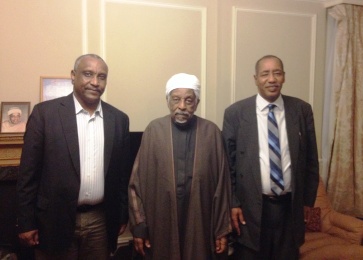DUP leader supports Addis Ababa agreement on national dialogue
September 25, 2014 (KHARTOUM) – Sudan’s Democratic Unionist Party (DUP) led by Mohamed Osman al-Mirghani has announced its support for an agreement on national dialogue and constitutional process, warning against the continuation of war and the current international isolation.

The eight point-deal signed in Addis Ababa calls for a peaceful settlement to the armed conflicts and urge to implement confidence building measures before to hold an inclusive and comprehensive conference inside the country.
The agreement “is a step forward in the way of desired comprehensive national reconciliation in Sudan,” al-Mirghani said in a speech delivered through video conference from London where is residing since a year ago.
Al-Mirghani who was addressing his party members further called to strengthen the deal and to take further steps aiming to bridge the gaps and build confidence between the stakeholders.
The Sudanese parties have to make the necessary efforts in order to “achieve peace and establish a free, democratic and stable country,” he said warning that the “current path followed by the country only leads to war and international isolation”.
The DUP and Khatmyyia sect on Thursday celebrated the 46th death anniversary of the sect leader and party founder Ali al-Mirghani in Khartoum North.
Since the bloody repression of anti austerity protests last year, al-Mirgani left Sudan and did not make political statements. However, since the signing of Paris Declaration on 8 August he received a delegation from the SRF rebels who briefed him on the political deal negotiated with the NUP leader Sadiq al-Mahdi.
The DUP chief reportedly is angered from president Omer al-Bashir because the latter did not implement a deal struck between the two men when he accepted to join the national government in December 2011following the cession of South Sudan. The leader of the historical party is calling to hold a “national consensus” conference.
Al-Mirgahni renewed his call to reach a national programme aiming to address the challenge threatening the country.
He further pointed out that the national consensus he is calling for is based on three pillars: “prioritising national issues over partisan interests, inclusivity of the national dialogue without excluding any party and the need to create a conducive environment by ensuring freedoms, release of political detainees and an amnesty for those who are politically prosecuted”.
Multiple sources within DUP said that Mirghani declined in the past period to meet officials from the National Congress Party (NCP) who sought to meet him in the British capital.
Observers say the DUP leader may withdraw his ministers from the NCD-led government, and rejoin the opposition camp if the government continues to refuse the postponement of the electoral process.
Two days ago, SRF secretary for external relations Yasir Arman told Sudan Tribune that during their meeting with him last August, the DUP leader pledged to boycott general elections in 2015 if the ruling party refuses to postpone it and forms a transitional national cabinet.
Sudanese parliament deputy speaker, Samia Ahmed Mohamed, accused Arman of seeking to hamper the ongoing efforts to hold the national dialogue, and added he is implementing “foreign agenda”.
The Sudanese government and the opposition forces agree on the need to hold a national dialogue to end war in South Kordofan, Blue Nile and the Darfur region. Also they agree on need to reach a national agreement on constitutional reforms after the independence of South Sudan.
Nonetheless, the ruling party refuses the idea of a transitional period where a national unity cabinet will implement any national agreement and needed reforms. Government officials accuse the opposition of planning to use this process to dismantle the regime while the latter lays the blame on the NCP saying they want artificial reforms and their manoeuvre intends only to break international isolation and lift economic sanctions.
(ST)
